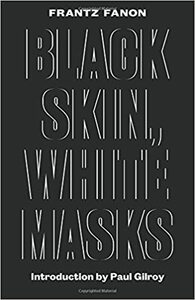Take a photo of a barcode or cover
challenging
informative
inspiring
reflective
slow-paced
challenging
informative
reflective
medium-paced
Initially, this book was added to my ‘to read’ list after being referenced in Into the abyss (Anthony David) and have been working on reading this pretty much since I finished it. It took a lot of time, purely because the actual prose was quite dense, but as you might expect from an academic.
I purposely haven’t put a star rating on this book because I felt from page to page my thoughts changed dramatically, and I think putting one will reduce my complicated thoughts with regards to the book.
For starters, as is acknowledged by pretty much everyone who reviews this book, Fanon skips over black women almost completely, and you could say that it’s because his experience is of a black man so will reflect that. But, in the one chapter he does devote to black women, it is in the context of their relationship with white men. As well of this, he is blatantly homophobic, the idea of intersectionality is non-existent, really.
Ultimately, I do not think that I have the knowledge to critic Fanons arguments on race and colonialism in any worthwhile way. A lot of what Fanon says is very poignant and thought provoking once you understand his direction, I just found it hard to get there in the first place.
Some notes I made whilst reading:
- It is interesting as the author (French) talks about racism in France, considering the rise of secularism (or the increasing attention it is getting) there. More so directed at Muslims it is a modern day example in support of Fanon’s argument in chapter 5 (rebuttal against Mannoni), and France being a racialist minded country. Not to say that it is more than, say, Britain; it is just interesting to point out modern day parallels from Fanon’s work.
- The author is sexist and homophobic, and has obviously no consideration for intersectionality.
- ‘It is the racist who creates the interiorised’
-
I purposely haven’t put a star rating on this book because I felt from page to page my thoughts changed dramatically, and I think putting one will reduce my complicated thoughts with regards to the book.
For starters, as is acknowledged by pretty much everyone who reviews this book, Fanon skips over black women almost completely, and you could say that it’s because his experience is of a black man so will reflect that. But, in the one chapter he does devote to black women, it is in the context of their relationship with white men. As well of this, he is blatantly homophobic, the idea of intersectionality is non-existent, really.
Ultimately, I do not think that I have the knowledge to critic Fanons arguments on race and colonialism in any worthwhile way. A lot of what Fanon says is very poignant and thought provoking once you understand his direction, I just found it hard to get there in the first place.
Some notes I made whilst reading:
- It is interesting as the author (French) talks about racism in France, considering the rise of secularism (or the increasing attention it is getting) there. More so directed at Muslims it is a modern day example in support of Fanon’s argument in chapter 5 (rebuttal against Mannoni), and France being a racialist minded country. Not to say that it is more than, say, Britain; it is just interesting to point out modern day parallels from Fanon’s work.
- The author is sexist and homophobic, and has obviously no consideration for intersectionality.
- ‘It is the racist who creates the interiorised’
-
funny
hopeful
informative
inspiring
medium-paced
2,5 i bardzo mieszane odczucia
Oczywiście "Czarna skóra, białe maski" to zbiór cennych spostrzeżeń, ważkich psychoanalitycznych tropów i, jak sądzę, przełomowych wniosków na temat zbiorowej, społecznej choroby psychicznej. I to można wziąć dla siebie.
Razi mnie przede wszystkim to, w jaki sposób Fanon badając pozycję Czarnego jako Innego, czyni Innym kobietę. Szkoda, że Karakter nie zdecydował się na jakieś krytyczne posłowie, które umieściłoby tekst Fanona we współczesnym kontekście.
Poza tym nie jestem fanką pióra autora, pisze chaotycznie i niespójnie, szarpanina nie pomaga w komunikacji z tym dość hermetycznym wywodem.
Najlepiej jest w zakończeniu, kiedy Fanon postuluje i wyzbywa się odpowiedzialności za historyczne doświadczenie. To jest to, z czym zapewne zostanę po lekturze.
Oczywiście "Czarna skóra, białe maski" to zbiór cennych spostrzeżeń, ważkich psychoanalitycznych tropów i, jak sądzę, przełomowych wniosków na temat zbiorowej, społecznej choroby psychicznej. I to można wziąć dla siebie.
Razi mnie przede wszystkim to, w jaki sposób Fanon badając pozycję Czarnego jako Innego, czyni Innym kobietę. Szkoda, że Karakter nie zdecydował się na jakieś krytyczne posłowie, które umieściłoby tekst Fanona we współczesnym kontekście.
Poza tym nie jestem fanką pióra autora, pisze chaotycznie i niespójnie, szarpanina nie pomaga w komunikacji z tym dość hermetycznym wywodem.
Najlepiej jest w zakończeniu, kiedy Fanon postuluje i wyzbywa się odpowiedzialności za historyczne doświadczenie. To jest to, z czym zapewne zostanę po lekturze.
challenging
informative
reflective
slow-paced
This was not the easiest book to read, but it did shed some insight into the psychology of a Black man that I wouldn’t have gained otherwise.
challenging
informative
reflective
slow-paced
Imagine sandwiching your nasty, dry misogynistic and homophobic thoughts in-between nuanced criticisms of racial theory and literary criticism, and you basically have the brunt of what's comprised within "Black Skin, White Masks". While in no way measuring up to "Wretched of the Earth", Fanon starts and concludes this book with searing analyses of racial politics, diving deeply into internalized racism and the BIPOC drive to achieve Whiteness. As he gears up into literary criticism, he examines the relationship between the two sexes of Black and White races, providing valuable insight into the ways in which BIPOC are driven toward Whiteness in so many facets of their relationships (see: BIPOC authors writing colonizer romances).
However, the moment Fanon veers into psychoanalysis is when the book takes a dive into the deep end. His chapter on the metaphysics of the Black man is ripe with misogyny and homophobia, starting with cheap and offensive illusions to rape culture steeped in victim-blaming, dipping his toes into the fetishization of the Black man without nary a glance at the over-sexualization of Black femme bodies, before veering headlong into the toxic masculinity of associating "sensuality" as something entirely foreign and alien.
As with most leftist political literature, a critical discerning eye is needed to wade through this book, but for those looking to read Fanon, I would definitely recommend stick with "Wretched of the Earth".
However, the moment Fanon veers into psychoanalysis is when the book takes a dive into the deep end. His chapter on the metaphysics of the Black man is ripe with misogyny and homophobia, starting with cheap and offensive illusions to rape culture steeped in victim-blaming, dipping his toes into the fetishization of the Black man without nary a glance at the over-sexualization of Black femme bodies, before veering headlong into the toxic masculinity of associating "sensuality" as something entirely foreign and alien.
As with most leftist political literature, a critical discerning eye is needed to wade through this book, but for those looking to read Fanon, I would definitely recommend stick with "Wretched of the Earth".
Read for a grad theory class. Many searing passages - I bookmarked and highlighted a lot, even as I cringed my way through his botched "analysis" of women and head-scratchingly weird suggestions about homosexuality. I get that Fanon's intention was to make room in psychoanalytic theory for the kinds of lives, circumstances, and backward realities that Lacan and Freud had, up till that point, ignored. And I find his ideas about reconstruction of the self fascinating - in particular, the notion that environment forms the ego and a break/descent from the world, which fails to correspond to individual experience, is necessary at some point in order to arrive at self-consciousness. I just wish he'd granted women the same psychological complexity as men in his assessment.
If I'm going to read theory, I'm going to read Fanon. Maybe Althusser.
challenging
dark
emotional
slow-paced







